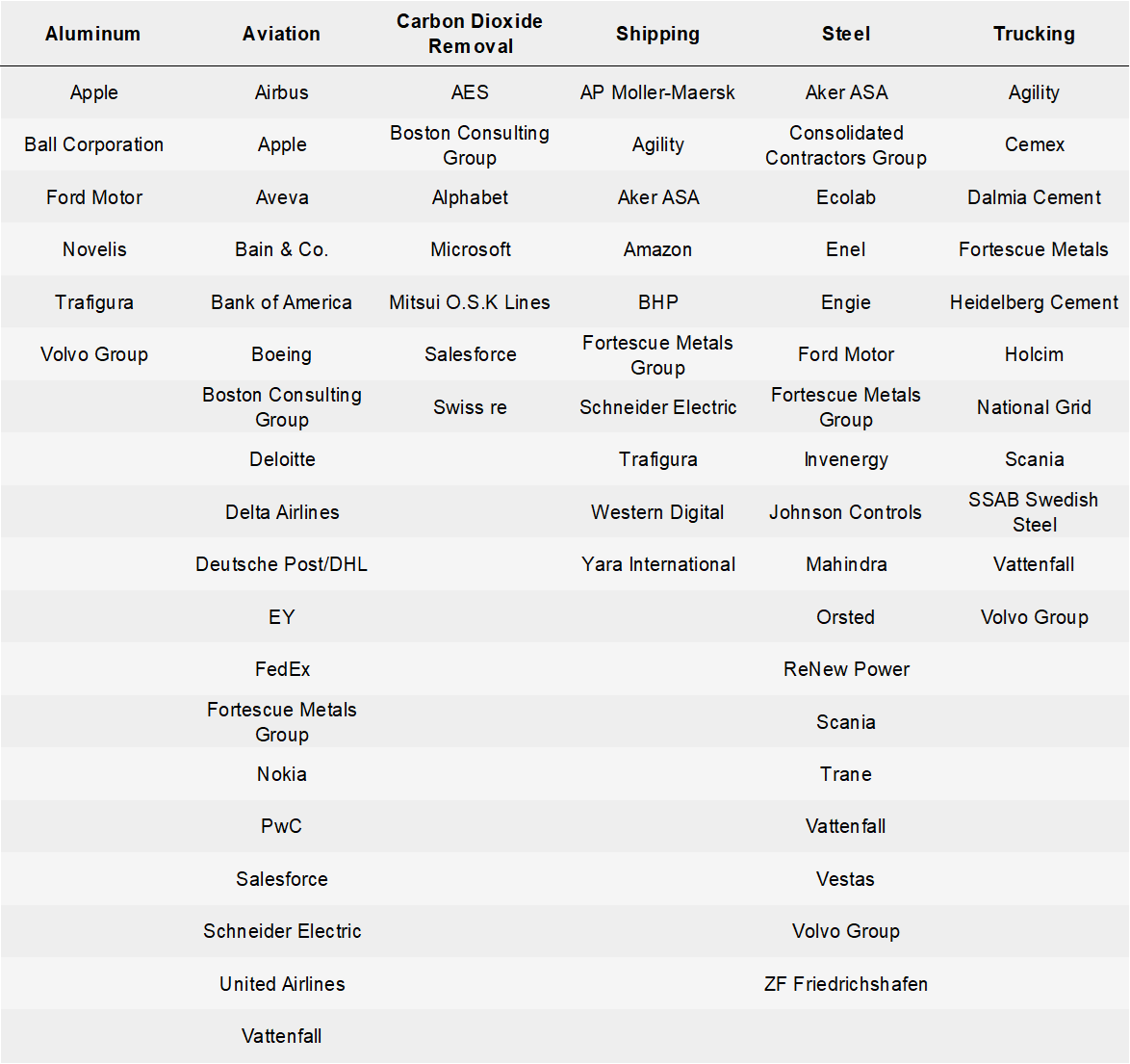Prices

June 5, 2022
CRU: World Economic Forum’s First Movers Coalition Adds Aluminum
Written by Greg Wittbecker
By Greg Wittbecker, Advisor, CRU Group
The First Movers Coalition (FMC) was launched in November 2021 at COP26 as a public-private partnership to decarbonize hard to abate sectors.
At that time, the 25 founding members of FMC targeted eight sectors where innovative technology would need to be applied to effect change. The sectors of initial focus were aluminum, aviation, cement, chemicals, direct air capture, shipping, steel, and trucking.
A first phase of sectoral commitments put emphasis on the steel, trucking, shipping, and aviation with the following goals:
Steel
- Members committed to purchasing volumes of near-zero emissions steel by 2030.
- Deployment of near-zero emissions iron- and steelmaking technology to deliver net-zero steel with minimal residual emissions.
- Steel purchasers set a target that at least 10% of their annual steel procurement volumes by 2030 meet or exceed the First Movers Coalition definition for “breakthrough steel.”
Trucking
- Members committed to purchase or contract zero-emission medium- and heavy-duty vehicles by 2030.
- Trucking owners and operators also set a target that at least 30% of their heavy-duty and 100% of their medium-duty truck purchases will be zero-emission trucks by 2030.
- Retailers and manufacturers set goals requiring their trucking service providers to meet the trucking owners’ and operators’ commitment by 2030.
Shipping
- Members committed to use zero-emission fuels in new and in retrofitted zero-emission vessels by 2030.
- Carriers set a target that at least 5% of their deep-sea shipping will be powered by zero-emission fuels by 2030 and on ships capable of using zero-emission fuel.
- Cargo owners set a target that at least 10 % of the volume of their goods shipped internationally will be on ships using zero-emission fuels by 2030, 100% by 2040.
Aviation
- Members committed to using advanced sustainable aviation fuels (SAF) with significant emissions reductions as well as electric and hydrogen propulsion by 2030.
- Airlines and air transport companies set a target of replacing at least 5% of conventional jet fuel demand with SAF that reduces life cycle GHG emissions by 85% or more compared with conventional jet fuel, and/or using zero-carbon emitting propulsion technologies by 2030.
- Airfare and air freight purchasers set a target of matching the targets of the airlines and air transport companies.
Focus on Steel: Well on its Way to Hitting its Targets
Members of the Steel Manufacturers Association (SMA) can rightfully argue that they were well on their de-carbonization journey before FMC came about.
The electric arc furnace (EAF) accelerated the movement away from virgin iron feedstocks into scrap. Most of the EAF mills are using 75-80% scrap in flat-rolled products and upwards of 90-95% in rebar and other long products. They can rightfully claim that they are already well down the road toward near-zero carbon intensity or “green steel.”
Aluminum Becomes Actively Engaged in FMC
On May 25, the FMC announced the addition of two new sectors to its initial first phase of sectoral commitments.
Aluminum and carbon dioxide removal joined the first four sectors. Apple, Ball Corp., Ford Motor Co., Novelis, Trafigura, and Volvo are founding members of the new aluminum sector. This brings the aggregate corporate membership in FMC to 55 plus nine leading countries. The corporate members have market capitalization of over $8.5 trillion, and the countries represent 40% of global GDP.
What are the Objectives of the New Aluminum Sector?
The founding members of the aluminum sector have committed to purchasing at least 10% near-zero aluminum by 2030, defined as carbon intensity of less than 3 metric tons of CO2 per ton produced.
In addition, Ball and Novelis have pledged that at least 50% of the aluminum they consume will be from recycled sources. Novelis currently uses about 57% recycled content.
This recycled content is a combination of new, industrial scrap, in-house runaround scrap, and post-consumer scrap such as used beverage containers.
How Does this Change the Dynamics of Low-Carbon Aluminum Adoption (LCA)?
Anyone who has been following the development of LCA over the past two years will see a common denominator with the launch of FMC’s aluminum sector.
Five of the six founding members represent manufacturers in high-profile consumer products in electronics (Apple), beverage cans (Ball) and automotive (Ford). If you don’t think Ball qualifies as a visible consumer brand, check out their logo on the Colorado Avalanche hockey team helmets and the name of their home arena in Denver! Ball has ramped up their efforts in sustainability and recycling enormously on the heels of the big rolling mill announcement we discussed last week.
These brand owners recognize that millennials pay attention to sustainability and vote with their wallets. Anyone who doubts this should look at the problems PET bottles have in the market, which aluminum beverage makers like Ball have been capitalizing on. Low recycling rates and high-profile images of plastic waste in the ocean have badly hurt demand for PET.
Automakers also recognize that the EU emission trading system (ETS) is pricing carbon ever higher and that eventually carbon taxation is going to impose a severe cost on manufacturers that do not reduce their carbon intensity. The shift to electric vehicles (EVs) is a big part of this, but lowering the carbon intensity of components in both EVs and internal combustion engines (ICEs) is being done concurrently.
Trafigura’s decision to join FMC demonstrates that the trading community once again “follows the money” and recognizes a unique trade opportunity. Trafigura has been securing attractive lines of capital predicated on low(er) carbon emission metrics. Their historical roots in scrap trading are also getting them interested in EV battery recycling and secondary aluminum. You see Glencore and others entering the secondary markets as well. This will bring fresh ideas and capital to the recycling sector.
Peer Group Pressure will Accelerate Decarbonization
The launch of FMC’s aluminum sector will trigger more companies to actively engage. Brand owners will not want to be left behind in this effort. They can’t afford to allow their competition to get the edge with millennials on sustainability. Don’t be surprised to see other automakers, electronics, and beverage companies joining the fold soon.
From a practical standpoint, FMC is not the start of decarbonization for aluminum. What FMC does for aluminum is bring even more attention to those sectors of the market that have NOT moved as quickly to embrace decarbonization. In aluminum, building and construction demand for low carbon has been tepid. There has not been much demand pull, yet. FMC could bring the needed visibility to compel more major players in this sector to put more emphasis on low carbon offerings.
Current First Movers Coalition Members (participation in multiple categories)

For more information about this topic, contact the author at gregory.wittbecker@crugroup.com.
Learn more about CRU’s services at www.crugroup.com.






